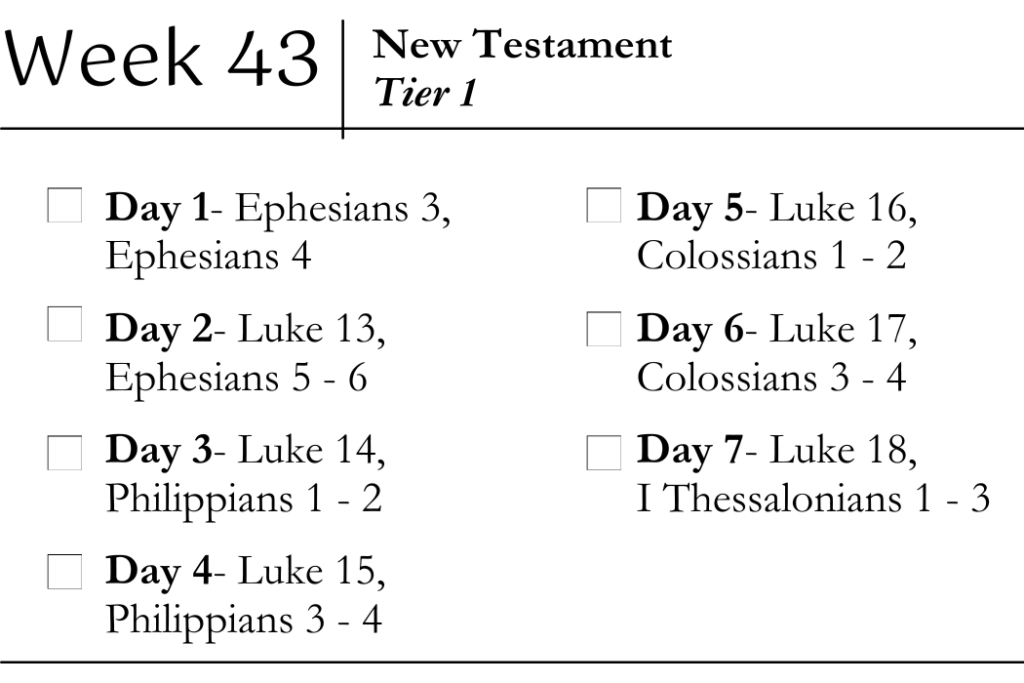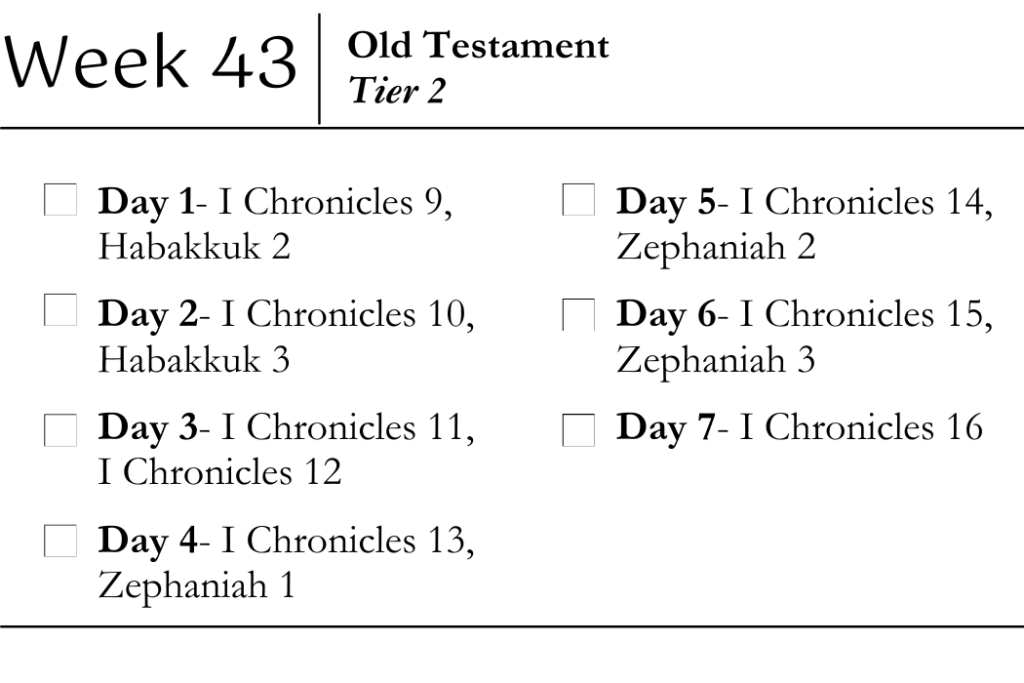When the word of God is indwelling, we relate to one another with the word.
This week, we walk with Jesus in the book of Luke, beholding His heart as He calls Israel to repentance and faith in Him. We will finish Ephesians, Philippians, and Colossians and begin 1 Thessalonians. All are rich in the truth of salvation in Christ. Both Ephesians and Colossians have a similar theme and outline.
In Chronicles, we finish the genealogies of Israel and then receive an abbreviated account of Saul. Remember, we will now follow all the kings of Judah (beginning with Saul), shared from a heavenly priestly perspective. We then begin the life of David as king, up to his bringing the ark into Jerusalem, placing it in what will be known as the Tabernacle of David. He sets the order for worship and delivers the first worship song to Asaph. We will finish the last two prophets who prophesied during the first temple era (before Judah’s exile): Habakkuk and Zephaniah.
WATCH That I May Know Him Week 43 PODCAST

GOSPEL
Luke 13 – 18
Luke records Jesus’ calling out to hardened hearts in Israel, who are hypocritically trusting in their own righteousness, “I tell you I do not know you, where you are from” (Luke 13:27). Take the lowly place, say yes to God’s invitation, and count the cost, are all addressed in Chapter 14.
Chapter 15 is all about repentance and the joy it brings in heaven, ending with the prodigal son’s return. Chapters 16 and 17 continue to call us to a heart relationship with the Lord ending with the Kingdom of God being revealed in our hearts. Chapter 18 is the Last Day’s exhortation in prayer, which is to persist and never lose heart and to be humble and not despise others. Jesus shares again, for the third time, his forthcoming journey to Jerusalem, his death, and his resurrection.
EPISTLES
Ephesians 3 – 6
Ephesians 3 is the fulness of the mystery of Christ and our participation leading to Paul’s prayer again for us to experience all of this. Then in chapters 4 through 6, we enter the practical outworking of these truths in our relationships—first within the body of Christ, then marriage, then parents and children, and finally with employers and employees. Finally, we are exhorted to stand against the devil in prayer, in the full armor of God.
Philippians 1 – 4
I love Philippians because it shows the heart of the apostle and the mind of Christ that we are to hold. Through thanksgiving and love-seeking, Christ is to be proclaimed in sincerity and truth. Knowing that their prayers and the supply of the Spirit will bring release are found in Chapter 1. Chapter 2 calls us to walk in the humility of Christ and become blameless by doing all things without complaining and disputing. Paul again draws attention to this heart attitude in Timothy. Chapter 3 is the path into maturity, through loss into gain. We are to be found in Christ, not having our own righteousness from the law but through being in Christ, that we may know Him. We end with practical calls to joy and gentleness in relationships and confidence in God’s provision in Christ.
Colossians 1 – 4
Paul follows the same theme as Ephesians, adding even richer fabric to the glorious gospel of Jesus Christ. Chapter 1 includes Paul’s prayer to be filled with the knowledge of His will in all wisdom and spiritual understanding (Colossians 1:9-18). There is a special emphasis not to fall back into the law and basic principles of the world in Chapter 2. Chapter 3 begins with our call to set our minds on the things above where Christ is, and to put off the old man with his deeds and put on the new man who is renewed in the knowledge of Christ. Now we are to apply all this to our relationships, put on love, and continue earnestly in prayer by letting the word of Christ dwell in us richly.
1 Thessalonians 1 – 3
In one of Paul’s first epistles, he writes to the Thessalonians who are suffering persecution for their newfound faith. Paul likens his love and care for them to both a mother in gentleness and a father in charging them to have a walk worthy of Christ.

HISTORY
1 Chronicles 9 – 16
The history of the Levitical priesthood and the family of Saul is given in Chapter 9. The end of King Saul is recorded in Chapter 10, and then we begin with David becoming king. For the next 19 chapters (the entire book of 1 Chronicles), we will follow David as he follows the Lord. His sin with Bathsheba is omitted because the Lord had blotted out his transgressions (Psalm 51). But his repentance and prayer after his sin of taking the census is recorded. Oh, the mercies of God to bring His kingdom forward in humble repentant hearts.
This week will witness David’s kingdom growing. Then in Chapters 13 through 16, it’s all about the Ark of the Covenant being brought to Jerusalem to be installed in the Tabernacle (tent) David built. In Chapter 16, David sets worship in order, with the Levites leading: “And he appointed some of the Levites to minister before the ark of the Lord, to commemorate, to thank, and to praise the Lord God of Israel” (1 Chronicles 16:4).
PROPHETS
Habakkuk 2 – 3
If you don’t have time to read all 42 Chapters of Job, then the three Chapters of Habakkuk will suffice. Chapter 1 is Habakkuk’s complaints. In Chapter 2 the Lord answers and calls Habakkuk back into faith and the knowledge of the glory of God; it’s time for Habakkuk to be corrected. In Chapter 3, Habakkuk returns as Job did because of His encounters with the Lord. The chapter then ends with his hymn of faith.
“Though the fig tree may not blossom, nor fruit be on the vines; though the labor of the olive may fail, and the fields yield no food; though the flock may be cut off from the fold, and there be no herd in the stall—Yet I will rejoice in the Lord, I will joy in the God of my salvation. The Lord God is my strength; He will make my feet like deer’s feet, and He will make me walk on my high hills.” (Habakkuk 3:17-19)
Zephaniah 1 – 3
Zephaniah prophesies during the reign of Josiah, declaring the day of the Lord is at hand to judge Jerusalem for their sin and complacency. The call to repentance goes out (Zephaniah 2:1-3) and the proclamation for judgment to the nations again concludes with Jerusalem in Chapter 3. God speaks to His faithful remnant whom He restores into a pure language, a meek and humble people, who shall trust in the name of the Lord.
“In that day it shall be said to Jerusalem, “Do not fear; Zion, let not your hands be weak. The Lord your God is in your midst, the Mighty One, will save; He will rejoice over you with gladness, He will quiet you with His love, He will rejoice over you with singing.” (Zephaniah 3:16, 17)

